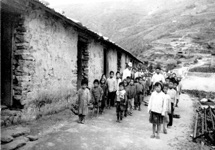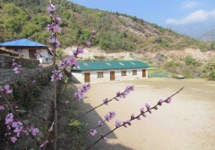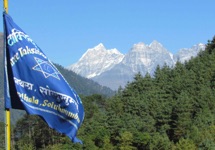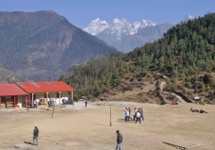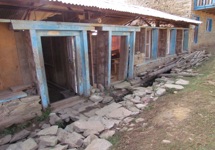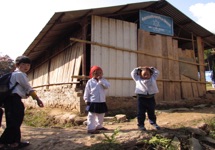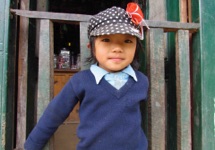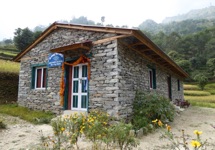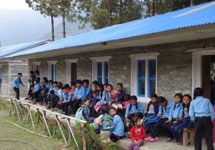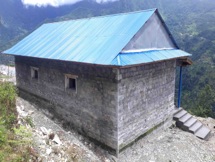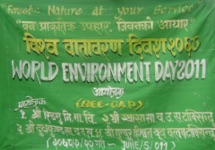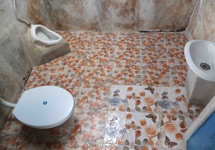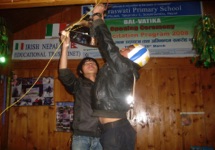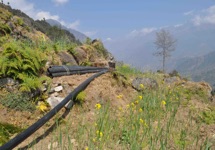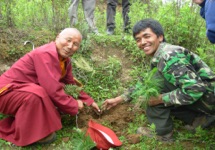INET in Nepal

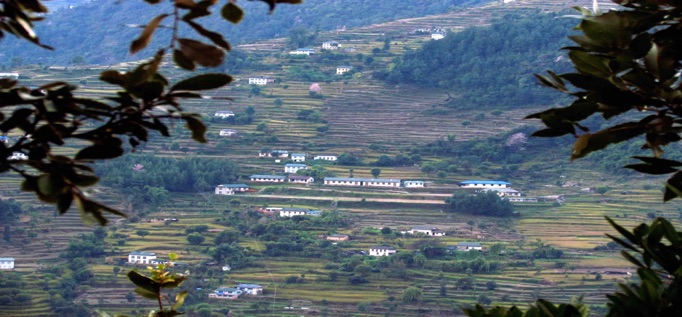
Shree Saraswati Bal Vatika and Phuleli Village
Following the initial meeting of INET in 1999 it was agreed that its first major project would be to raise funds for the construction of a Bal Vatika or infants’ school in Phuleli village. The request for this building came from Dhana Bahadur Rai on behalf of villagers in his local area. Dhana’s first encounter with Irish mountaineers took place in 1990 on Island Peak, a meeting that would lead to his participation on trekking trips for Irish groups. Three years later he was a member of staff on the successful Irish Everest expedition. Later Dhana visited Germany where he was introduced to the concept of the Kindergarten School. From a sketch plan for a three roomed school building emerged the first Bal Vatika, one of several fine school buildings funded by INET at Phuleli. These would replace older dilapidated structures that had been on that site. At first, funds for the project came in slowly and it was not until teachers and pupils from Alexandra College Dublin lent their support that financial targets were reached. In the interim, local people in Phuleli had begun clearing a large flat site on the steeply sloping hillside as their voluntary contribution to the project. It took hundreds of hours of their work to create the spacious flat area that exists today. This now provides an outdoor arena suitable for various sports and is also used as a gathering place for local celebrations. Shree Saraswati Bal Vatika was officially opened on 20th March 2008 and has served as an example for several of the other infants’ schools built in the locality. The film:
“Everest Gives Back - The story of INET” tells more of the story.
Nunthala Village
The importance of pre-primary education is increasingly recognised in Nepal. Prior to the construction of this second Bal Vatika in Nunthala village, the children were being educated in the same classes as their older siblings, to the detriment of their educational development. INET was asked for funding to construct this high standard block containing two classrooms, a rest room and toilet facilities. INET approached Combined Services Third World Fund (CSTWF) in Ireland who made a grant to build the school and the official opening was on 3rd April 2010. INET had also paid for the training of a Montessori teacher and the school’s facilities are tailored to enhance early learning so the children are well prepared to attend primary school. It also encourages parents to send their infant children to school and helps to ensure that children enjoy attending school from a very young age. After the 2015 earthquakes, it was heartening to see very little damage to this well built school.
Rapchha School Rebuild 2015 - 2018
Two terrible earthquakes struck Nepal in April and May 2015. In November, a small group from INET travelled to Nepal to inspect some of the schools supported by INET. Rapchha had suffered the most damage as only four of the original nineteen classrooms remained useable. Classes continued in temporary structures of wooden planks, tarpaulins and tents. It was interesting to see that two single story blocks, built to a very good standard a few years earlier, suffered no damage. Likewise, the INET funded infant school buildings at Phuleli and Nunthala received very little or no damage because of their good design. During their visit to Nepal, the INET team liaised with local engineers regarding the Nepal Government’s new post earthquake building code “Build Back Safer”. Following lengthy discussions with the school board and headmaster, it was agreed INET would fund two new two classroom blocks to replace some of the damaged school. A very generous core donation by Peter Boyle, together with an emergency grant from Combined Services Third World Fund (CSTWF) allowed building work to commence very quickly. These new classrooms have been built according to the Government code and were officially opened on May 6th 2018. Additional fundraising, by so many generous individuals, has allowed new furniture and other equipment to be supplied to this vibrant school which celebrated its 50th Anniversary in January 2019. The original Bal Vatika building had also been destroyed in the earthquake. It was demolished to make way for the new buildings and playground. A brand new infants school, built with funds from Re:Help in Germany, sits on a fine location over looking the newly enlarged school campus. The film: “After the Earthquakes”
shows some of the effects of the tragedy and INET’s reaction to it.
Juving Bal Vatika
In 2016, an application was received from the school committee to build an infants’ school in Juving (Jubing) village. The Bal Vatika is situated steeply up on the far side of the Dudh Koshi River Valley, away from Phuleli. INET had spread its wings to help this much more remote community. Mr. Makar Bahadur Khaling Rai had already donated part of his land to the Juving Secondary School for a building for the little children of the village. INET approached the JP McManus Charitable Trust which made a generous grant to build the school. Local labour, and volunteers, completed this lovely building which was officially opened on 17th March 2018. Additional money for some small cost over-runs was raised by INET to complete the building work. The new infants school has indoor toilets, wash hand basins and showers which will be very useful for the little children, especially during the monsoon season. The village is adjacent to the popular trekking trail to Lukla airfield and then on to Namche Bazaar and Everest Base Camp. Here, as in all the other mountain villages, it is essential that children have the opportunity of a good education, from a very early age, to equip them with the potential that tourism presents.
Kophu Village
Kophu, and its neighbouring villages, are remote with about three hundred households. Land had already been donated by Mr. Kaji Rai to build an infants’ school. INET applied to Combined Services Third World Fund (CSTWF) whose grant enabled this to be built. Locals and the school committee volunteered to help transport stones and other materials which had to be carried on porters’ backs due to the lack of roads. The Bal Vatika was officially opened on 15th November 2015. Some fifty children, aged from four to six, attend and enjoy their new school. Local people have widened and improved the path connecting the school to outlying villages so the little children can go safely to school. Nepal is one of the least developed countries in the world. A lack of proper sanitation and hygiene can be the cause of many diseases. The new school in Kophu has toilets and running water. INET always makes provision for improved hygiene and sanitation an uppermost priority when developing schools and community buildings.
Waku Bal Vatika
Waku village is even further from Phuleli than Juving. It is located on a remote mountainside with very difficult trails for access. An existing school was badly damaged in the 2015 earthquakes. The school committee had decided that a brand new Bal Vatika for infants would complement the rebuilt school for older pupils. Construction work, funded by INET, commenced in 2017. Transportation of cement, sand, steel rods and other materials to ensure compliance with the earthquake “Build Back Safer” code made for complicated logistics and increased costs. The villagers and committee carried out voluntary building work alongside the regular builders. Mostly completed in early 2018, the Bal Vatika is well finished, bright and cheery, with good materials for the little children. The official opening took place on 4th May 2018 and a cash donation, collected from donors in Ireland, before the opening, was used to start a school maintenance fund. Happily for the new school, this was match funded by a local government representative at the ceremony. Multiple INET donors provided finance for this project, including Spartan Red Sox Walking Club, Drumbeg Parish Church, Robert Bankhead Memorial Fund and Whiteabbey Primary School. Due to some roof work issues during the monsoon, Dhana’s Saptarangi Foundation Nepal provided some money to ensure that necessary alterations were carried out before the rains really set in.
Hakula Bal Vatika
Hakula is one of the most remote villages in the Solu Khumbu, located well away from the main trekking route to Namche Bazaar and Everest Base Camp. It is in the corridor of Kharikhola and the lower part of the Mera Peak Valley. The original name was Hangkula and it is quite a large village where about 250 pupils attend the local junior school. Inspired by the success of the Bal Vatika in Phuleli, the school committee felt that a good school for the little children is needed. The site for this is complicated by the topography of the land and the arrangement of the existing buildings. The Stansfield Trust in Northern Ireland provided funds and INET’s Patron, Dawson Stelfox, the first Irishman to climb Mount Everest, drew up plans with Dhana. Negotiations for the land purchase and planning permission all took some time and construction commenced in the summer of 2019. As is usual in Nepal, the work was held up by the monsoon season. Also, as is usual in rural Nepal, the local villagers come in behind these projects putting their backs into volunteering to work alongside the paid builders. This attractive new school was completed in early 2020. The official opening was postponed because of the Covid-19 global pandemic.
INET’S Wider Activities
Through the generosity of supporters and sponsors, INET’s funding activities in these Nepal villages is wide ranging and of considerable benefit to the rural mountain communities in this under developed country. As well as building schools for little children, INET donors’ kindness allows improvements and new equipment to be supplied to schools in several villages. In Janakalyan Bal Vatika, Hatemu Village, a new ensuite toilet and bathroom was built with money kindly given by a friend and supporter. New classroom furniture was supplied from INET funds. An INET community building built in Chhee, near Phuleli, was damaged in the 2015 earthquakes. During a visit by a small INET team in November of that year, an immediate payment from Irish Himalayan Trust allowed urgent repairs to take place. INET’s ethos is that its supported schools are open to all, whatever their background. An irrigation and water supply was financed, together with a small hydro-electric generator. The school in Phuleli had suffered from a lack of electricity supply. INET applied for a grant to Electric Aid Ireland, the funding agency run by the staff at the ESB. The buildings are now connected and power is distributed for lighting and computer use. This allows the school to be used until later in the day for the benefit of the village. INET helps supplement some of the teachers’ salaries to ensure the children get sufficient quality teaching cover. A small science laboratory was built in Phuleli and equipped by German friends of Dhana. A new project for early 2020 is the provision of a childrens’ “play park” at Nunthala school. This will be a facility with the latest equipment to encourage little children to interact socially outside of the classroom, and to enjoy similar fun as their western counterparts in Europe. The money for this is provided by the Combined Services Third World Fund (CSTWF). There is always be a need for financial help in Nepal for school equipment and a major shortage of school libraries.
Environmental Education
This vitally important in a developing country whose geography is extremely susceptible to climate change. Environment awareness is on the agenda at all INET schools. Both socially and economically, it is important to encourage local farmers to understand these changes and to become much more sustainable in their activities. INET encourages this and actively works with Dhana and his team to explore suitable horticultural methodology and agricultural training. An INET director is a botanist and a part time associate professor at a Nepalese university. Schemes to encourage cash crops, and beekeeping for honey, are on the horizon, along with additional education in re-forestation.
